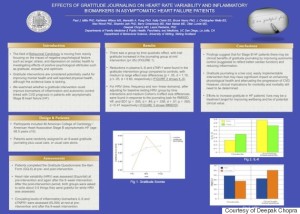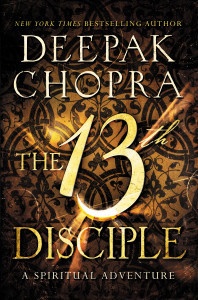Published in the Huffington Post: Gratitude
“Effects of Gratitude Journaling on Heart Rate Variability and Inflammatory Biomarkers
in Asymptomatic Heart Failure Patients”
By Paul Mills, PhD, Kathleen Wilson MS, Meredith A. Pung PhD, Kelly Chinh BS, Brook Henry PhD, J. Christopher Wells BS, Alex Wood PhD, Shamini Jain PhD, Barry Greenberg MD, Alan Maisel MD, Ottar Lunde MD, Deepak Chopra MD, Laura Redwine PhD
Departments of Family Medicine and Public Health, Psychiatry, and Medicine, UC San Diego, La Jolla, CA
Department of Behavioral Science, University of Stirling, Stirling Scotland
For the last decade or so, the field of behavioral cardiology has shifted its focus from being primarily on psychological traits such as hostility, stress, and depression to more positive psychological attributes such as gratitude, compassion, and empathy. In individuals with heart failure, gratitude has been identified as an important resource for alleviating the struggles associated with symptoms. In a recent cross-sectional study on over 180 asymptomatic heart failure patients, we reported that more gratitude was associated with less depression, better sleep, and less peripheral inflammation. In this new study, to be presented at the University of California, San Diego Institute for Public Health’s Annual Public Health Research Day (to be held April 9, 2015), we report on the results of a randomized clinical trial where patients were randomized to either 8-weeks of gratitude journaling plus their usual care or 8-weeks usual care alone. Journaling was used as a way to cultivate gratitude. We found that patients who journaled about gratitude had increased heart rate variability (a measure of reduced cardiac risk) as well as reduced circulating levels of inflammatory biomarkers IL-6 and sTNFr1, which are associated with cardiovascular disease. Gratitude journaling is a low-cost and easily implementable intervention that may have significant beneficial effects to enhance health in cardiac patients.


